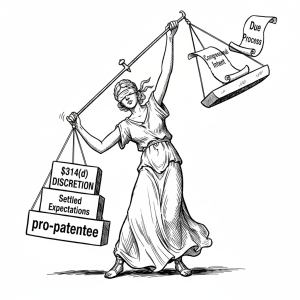Two additional mandamus petitions have joined the Federal Circuit's growing docket challenging the USPTO's 2025 shift toward more restrictive inter partes review (IPR) institution practices under President Trump, bringing the total to five pending cases that collectively test the boundaries of appellate review under 35 U.S.C. § 314(d). The newest petitions are In re HighLevel, Inc. (No. 25-148) and In re SanDisk Technologies, Inc. (No. 25-152). Both challenge Director Stewart expanded discretionary denial approach that rescinded the Vidal memo that petitioners had previously relied upon. HighLevel challenges the USPTO's categorical use of § 101 district court rulings to deny IPR institution for §§ 102/103 challenges, while SanDisk attacks the agency's invocation of "settled expectations" and resource management concerns to deny institution despite litigation stays and Sotera stipulations limiting claim scope overlap. Prior Patently-O Posts:
- Dennis Crouch, SAP’s Mandamus Petition Challenging Trump Admin’s Discretionary Denial Policy Shift, Patently-O (July 2, 2025) (outlining SAP’s petition that the February 28, 2025 rescission of the Vidal memo violates APA, retroactivity, & due process).
- Dennis Crouch, Motorola Follows SAP with Mandamus Challenge to Acting Director Stewart’s IPR Policy Reversal, Patently-O (July 10, 2025).
- Dennis Crouch, In re SAP America: Sharpening the Dispute over PTAB Discretionary Denials, Patently-O (July 16, 2025).
- Dennis Crouch, The Power of Unreviewability, Patently-O (July 22, 2025) (exploring how § 314(d) implicates unreviewability of institution decisions; particularly whether legal or constitutional challenges survive when the agency asserts that § 314(d) makes certain decisions final and non-appealable).
- Dennis Crouch, Still Pending: Three Mandamus Petitions Test USPTO’s Expanded Denial Powers, Patently-O (Sept. 15, 2025).
The Federal Circuit has requested responses from both the USPTO and IPR petitioners in all five cases (including the earlier In re SAP America, Inc., In re Motorola Solutions, Inc., and In re Google LLC petitions). This is an unusual step that the court often skips in mandamus practice and signals at least some judicial interest in the underlying legal issues.
Each petition attempts to characterize the USPTO's February 28, 2025 rescission of the Vidal Memo and subsequent policy implementations as constitutional violations or ultra vires agency action.
To continue reading, become a Patently-O member. Already a member? Simply log in to access the full post.
